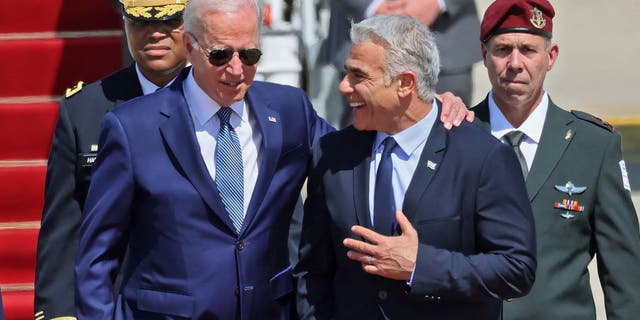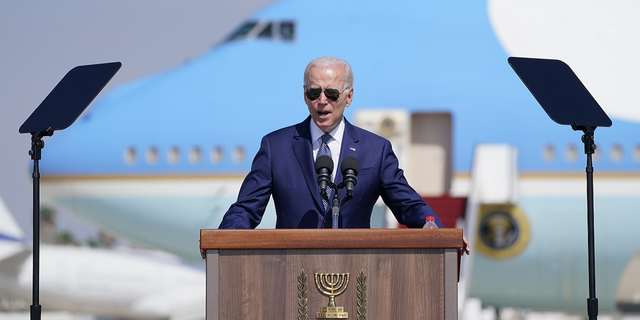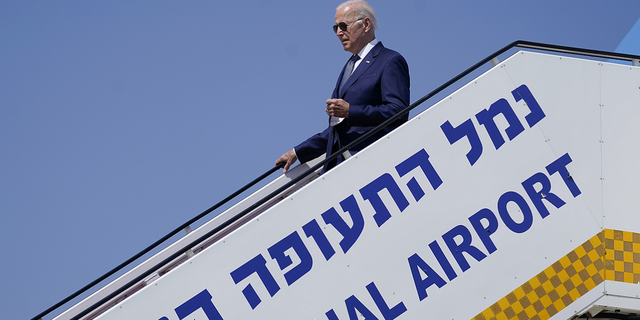NEWYou can now listen to Fox News articles!
A great deal of the attention being devoted to President Biden’s upcoming visit to Saudi Arabia this week. It will be his first to the kingdom as president and it has focused on the immediate challenges in the relationship.
National security council coordinator for the Middle East and North Africa Brett McGurk’s latest round of talks in Riyadh, reportedly intended to iron out details of the agenda for the president’s visit, will undoubtedly address next steps on security cooperation, confronting Iran in view of the stalemate over nuclear negotiations, the conflict in Yemen, and finding common ground on Russian aggression in Ukraine.
While not in the room, solidifying Israel’s growing role as a regional security partner will factor into the visit.

U.S. President Joe Biden is welcomed by Israeli caretaker Prime Minister Yair Lapid upon his arrival at Ben Gurion Airport on Wednesday.
(Jack Guez/AFP via Getty Images)
Likewise, although the administration, including the president, has insisted that oil production will not be on the agenda, it will almost certainly be in the background of the talks. Moreover, the president would be hard-pressed to come back to the U.S. without being able to say that he raised American concerns about respect for human rights, including the Khashoggi murder.
BIDEN HEADS TO MIDDLE EAST TO PITCH IRAN NUCLEAR DEAL TO UNEASY ISRAEL, SAUDI ARABIA
Still, even if there is success in moving forward on all of these fronts, it will not change the reality that U.S. relations with the Gulf have been on a downward trajectory for the better part of two decades.
In fact, the twin pillars of the relationship — energy and security — are no longer the unshakeable imperatives they once were.
The perception that U.S. dependence on the region for its energy requirements, is, perhaps over-optimistically, no longer a compelling issue allows for an American leadership and public that prioritizes values-based foreign relations.
Meanwhile, years of American rhetoric about deemphasizing the Middle East, along with unhappiness over U.S. policies on Iran, the Arab Spring, Yemen, Syria, and Iraq have weakened regional confidence in U.S. leadership and reliability.
AS HE HEADS TO SAUDI ARABIA, BIDEN SHOULD LOOK TO TEXAS AND SEND A SPECIAL ENVOY TO MIDLAND
Despite these factors, however, the Biden administration has come to recognize that reliable relations with the Gulf states remain important for advancing core U.S. interests, from challenging Chinese and Russian global expansionism to stabilizing the Middle East and preserving global energy security.

President Joe Biden speaks during an arrival ceremony after arriving at Ben Gurion Airport on Wednesday, July 13, in Tel Aviv, Israel.
(AP/Evan Vucci)
Beyond recognizing the importance of the relations, however, the U.S. and our regional partners need also to address the changing dynamics in the region:
*Gulf leadership, especially in Saudi Arabia and the United Arab Emirates, has been passed to a new generation that is more confident and assertive and less likely to accept U.S. policy preferences unless they are convinced they are in their national interest.
*The region is no longer uni-polar. Chinese and Russian engagement in the region is permanent, economically and politically important to the region. The Gulf states will balance their interests with the U.S. against their interest in protecting ties to Beijing and Moscow.
*While the U.S. remains the region’s security partner of choice (increasingly in coordination with a growing Israeli role), regional leaders have also made clear that they are seeking to reduce regional tensions and lower the security threat.
OIL, IRAN AND NORMALIZATION TOP THE AGENDA AS BIDEN EMBARKS ON TRIP TO ISRAEL AND SAUDI ARABIA
To be sustainable, therefore, the Biden initiative in visiting the Gulf must reach beyond today’s headlines and begin to build new frameworks for cooperation and coordination.
Gulf interlocutors have made clear that they continue to value personal contact between leaders as a principal instrument for managing bilateral relations. They hold out Russian President Vladimir Putin’s positive engagement with Gulf interlocutors as an example of how this outreach can affect their policy decisions.
In the past, U.S. presidents and their Gulf counterparts met generally at least twice a year, in New York on the margins of the U.N. General Assembly and in the region. Those regular meetings should be reinstated.
CLICK HERE TO GET THE OPINION NEWSLETTER
Yet it’s also clear that, when strained, those personal relationships can complicate cooperation rather than enhance it. Moreover, the breadth and depth of issues confronting the region has outstripped the capacity of the leaders to address all of them in their brief exchanges.
Therefore, the two sides need to strengthen bilateral coordination at lower levels of government. The U.S. maintains strategic dialogues with several of the states in the region, but they have been used intermittently in the past and have not been empowered to provide real policy direction. That should change.

President Joe Biden walks off of Air Force One as he arrives at Ben Gurion Airport.
(AP/Evan Vucci)
The parties should ensure that strategic dialogues led by Cabinet-level officials meet on a regular basis and enjoy decision-making authority, supported by sub-committees that can manage a full agenda of bilateral issues.
As the U.S. retains an interest in promoting development of the GCC as a serious regional coordination mechanism, the administration should also promote establishment of a parallel dialogue at the multilateral level.
CLICK HERE TO GET THE FOX NEWS APP
Finally, the U.S. and its regional partners should move beyond the focus on security and energy as the principal features of cooperation. The global pandemic has brought to the forefront an understanding that cross-cutting issues like public health and climate change are going to be main drivers of regional and global development in the years to come.
The U.S. enjoys global leadership on these issues and it should ensure that its renewed framework for regional dialogue includes in its agenda building out cooperation in managing them.
George is Digismak’s reported cum editor with 13 years of experience in Journalism